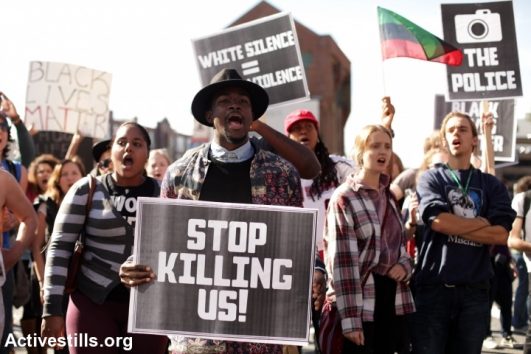By using his platform to elevate marginalized Palestinian views onto the global stage, Marc Lamont Hill’s UN speech challenged the unequal parameters of permissible thought on the conflict.

Watching Marc Lamont Hill’s speech at the United Nations on Wednesday was like a breath of fresh air. Unlike the mundane and repetitive remarks made by aging diplomats, Hill delivered a powerful articulation of the Palestinian struggle and how he, as a Black American, identifies with their cause. More provocatively, Hill reflected upon the history of Black resistance to “American apartheid,” which ranged from nonviolent boycotts to slave revolts, saying that true solidarity “must allow the Palestinian people the same range of opportunity and political possibility.”
Pro-Israel advocates have portrayed Hill’s speech as a violent and anti-Semitic diatribe, focusing especially on his call to achieve “what justice requires, and that is a free Palestine from the river to the sea.” They claim that this phrase is a “genocidal” and “jihadist” slogan associated with groups like Hamas, and that it implies the elimination of the Jewish state, if not the Jewish people on the land. CNN, for which Hill was a frequent contributor, severed its ties with him following the uproar.
Aside from the fact that many of Hill’s critics deliberately misconstrued the content of his speech, the hysteria over the phrase “the river to the sea” is grossly misplaced. Groups like Hamas do not own, nor do they orchestrate, the source from which that phrase derives: the Palestinians’ collective desire to fulfill their human rights in their historical homeland. Conflating the two is politically dishonest and viciously dehumanizing; it encourages the belief that the Palestinian cause is something to be defeated, rather than respected.
The outrage is also hypocritical, given that the premise of the phrase is as embedded in Israeli-Zionist consciousness as it is in the Palestinian one. Take the first article of the Nation-State Law, which asserts that the land of Israel (stretching from the Mediterranean to the Transjordan) is the “historical homeland of the Jewish people.” Or, take the legislation being advanced in the Knesset, which would formalize Israel’s fifty-year de facto annexation of two-thirds of the West Bank. Or, take the words of center-left opposition leaders who, like right-wing officials, pledge to keep East Jerusalem and the Jordan Valley under Israeli rule in any peace deal.
These unequal parameters of permissible thought on the conflict, and the extent to which they remain so ill-informed, are illustrated once again by the furor over Hill’s remarks. It is acceptable to refer to the “Land of Israel” but extremist to recall “historic Palestine.” Violence and coercion are deemed rational tactics, but only when used by an occupying army. Palestinians can live under a single state with Israelis, so long as it assumes Jewish supremacy.
As Omar Baddar wrote on +972, nothing should be controversial about demanding justice in the one-state reality in which Israelis and Palestinians live. The problem lies in the opposing visions for that state: one seeks dominance and privilege, the other demands equal rights and dignity. These two visions cannot be equated: if Israel views Palestinian freedom as its deathblow, then it reflects a perverted ideology on the part of the state, not of activists like Hill.
Hill’s speech thus challenges the norms that have long undermined the right of Palestinians and their allies to narrate their reality and re-imagine their future. By using his platform to elevate marginalized Palestinian views onto the global stage – and in bearing the severe backlash for doing so – Hill has given a masterclass on how to exercise effective and meaningful solidarity.

